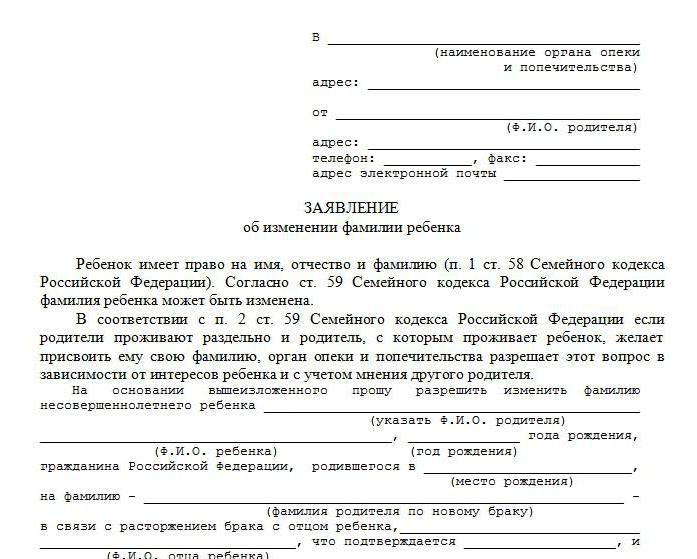Author of the article: Lina Smirnova Last modified: January 2021 13534
The consequence of a couple’s separation is not only the division of common property and the decision of which parent the child will remain with, but also often a change of one’s last name to the one that existed before the marriage. After changing your last name, you usually have a desire to change your child’s last name. Let's consider how to change a child's last name after a divorce at different ages, what conditions must be met, what reasons can serve as the basis for a change, whether it is possible to change it without obtaining the consent of a parent who does not live with the child, and where to go for this.
Reasons for changing a child's surname
After their parents separate, children often stay with their mother, and she wants her and her children to have the same surname. Such a desire does not arise out of nowhere, just to annoy the ex-spouse, but in connection with reasons that can be considered serious reasons.
The main ones are the following circumstances:
- Uncomfortable situations often arise in the family due to the different surnames of the mother and her child. She constantly has to confirm her relationship with him by presenting his birth document along with her passport;
- the woman is concerned that in the future the child may have difficulties receiving an inheritance;
- When dealing with any legal issues concerning the child, one has to require the participation of the absent father, this causes certain inconvenience. For example, the father’s consent is required to register a child at a new place of residence, but he lives in another region remote from the place of registration of the child;
- The reason may also be the dissonant sound of the surname, which causes difficulties when the child communicates with peers;
- The fact of deprivation of the father's parental rights can also motivate the mother to change her mind;
- the need to change data arises if the mother remarries and the new husband adopts the child.
Important! The child himself can apply to change his surname when he becomes an adult.
Who is registered as a child born after a divorce?
So, within the framework of the law, the ex-husband is recorded in the child’s birth certificate as the father, and the baby is given a patronymic name based on his name.
But does the “300 days” law always apply to children born after divorce, and does it always protect the interests of the child? What if the situation does not suit all members of the former family, including the baby’s mother, then what to do? Let's consider these cases in more detail. Indeed, if the real father of the child is not the former spouse, but the future one, a lot of problems arise as to how to re-register everything correctly and legally in the future.
To avoid complications, it is important for an “unsettled” mother to arrange a marriage with the child’s father before the baby is born..
However, if such a situation does arise and the new marriage is not registered, the applicant must file a claim to be included in the register of records as the father of the newborn, and his presence is required when registering the birth certificate.
The presence of the former spouse is not required; he can, with the help of a proxy, submit a notarized statement that he does not consider himself the father of the newborn.
Also in this case, a statement from the child’s mother confirming the paternity of the future spouse is required. If the parties act correctly, the entry about the parents is corrected in the registry office book.
Dear readers! To solve your problem right now, get a free consultation
— contact the on-duty lawyer in the online chat on the right or call:
+7
— Moscow and region.
+7
— St. Petersburg and region.
8
- Other regions of the Russian Federation
You will not need to waste your time and nerves
- an experienced lawyer will take care of solving all your problems!
Where to contact?
For permission to change the child’s surname, the parent will have to contact one of the following authorities:
- to the guardianship and trusteeship authorities;
- to the court.
The guardianship authority should be contacted when the child is under 14 years of age and the parent living separately does not object to changing his surname. In some cases, the law may allow a request to change a name to be approved without obtaining the permission of the absent parent.
When contacting this body, you need to take into account that the reasons for changing your last name are of great importance for obtaining permission, which should be stated in the application in as much detail as possible. The emphasis in describing the situation should be on the interests of the child himself.
A large percentage of cases of this kind are considered in court. It is especially often necessary to go there if it is impossible to obtain consent from a parent who does not live with the family. Preferable for applying to this authority is the opportunity to convince the court of the fairness of the demand and to defend the claimed rights on the basis of the evidence presented about the need to change the child’s surname without the participation of the father.
When is it possible to change a surname without the consent of the father?
It is possible to change a child’s surname at the request of one parent, who is usually the mother, in cases where:
- the father, without any reason, does not pay the alimony assigned to him during the divorce. Proof of this fact is the provision of payment documents for the transfer of funds for child support, which were absent for six months. The woman can also present copies of claims from executive bodies and decisions imposing administrative punishment on the defaulter;
- the father withdrew from raising and participating in the child’s life. The best evidence of this fact can be testimony. To do this, you can involve the family’s close circle: relatives, neighbors and other citizens with whom the family comes into contact. If the reasons listed above exist, the mother may seek to deprive the second parent of the rights to the child;
- The father's place of residence is unknown, and all measures taken to find him were unsuccessful. Evidence may include inquiries at the place of his registration, attempts to contact him through relatives;
- the child was born out of wedlock. When there is a dash in the “father” column on his birth certificate or he is indicated according to the words of the mother herself, then it can be proven in court that he is not such;
- the father was found in court to be incompetent and not aware of his actions. To prove this fact, a medical report and a court decision recognizing the incompetence of the ex-husband will be required.
Changing the child's surname to the surname of the mother's new husband
After separation, former spouses can create new families. If the child’s mother remarried and took the surname of her second husband, then, as a rule, she wants the whole family to have the same surname and strives to transfer the child to the stepfather’s surname. She also has the right to obtain permission from the guardianship authorities, if only her own father gives consent. At the same time, he will retain all rights and obligations in relation to the child, and he will continue to be listed as his father according to documents.
If the new husband decides to adopt a child, having received the consent of the natural father, then the child will change to the surname of the new husband on the basis of adoption. At the same time, he will have a new not only last name, but also a patronymic corresponding to the name of the new parent. The biological father will legally lose all rights and obligations regarding the child.
Features of changing a surname depending on the age of the child
According to the procedure established by law, children born in marriage are assigned the surname of one of the parents. If, after registering a marriage, a couple decides to have the same last name, then the child they have is given their common last name. If the spouses left their previous surnames after marriage and they are different, then the child is assigned the surname of one of the parents by mutual consent. It can be left either in the mother's surname or the father's. True, sometimes he becomes the bearer of a double surname, consisting of maternal and paternal, written with a hyphen. But this is rare and not entirely convenient.
Parents can change their child's surname at will only until the child turns 14 years old. When he reaches the age of 10 years, his desire to change his surname must also be taken into account.
When a child turns 14 years old, he becomes a full citizen of the state with his own passport. Therefore, it is possible to change the mother’s actual surname without the participation of the guardianship authorities. However, permission for this procedure from the parents must still be submitted to the registry office.
The exception is the emancipation of a teenager aged 16 to 18 years. Then he will have the right to independently apply to the registry office with an application to change his parental surname. He is not required to obtain permission from them. But he will have to prove his capacity to provide for himself and be independent from adults. Evidence can be certificates from the place of work, a copy of the work record book or the statutory documents of the entrepreneur.
General aspects of changing a surname between the ages of 0 and 13
Changing the personal data of a minor has its own characteristics. Parents who wish to change their child's surname must follow the following procedure:
- Obtain parental consent.
- Obtain permission from the district guardianship department.
- Register the change in the district registry office.
Parental consent
If changing the surname is a common decision of the parents, then they will not have any difficulties with the process. Each of them issues written consent. The document is drawn up in simple written form at the district guardianship department in the presence of a specialist. The citizen confirms his consent with his signature.
A sample of a father's permission to change a child's surname can be downloaded here
If the second parent lives in another region, he must provide consent certified by a notary. The document is sent to the applicant or directly to the district guardianship department.
Important! Parents' consent is only required if they live together or are in a registered union.
Permission from the district guardianship department
Is it possible to change a child's last name after a divorce? This requires permission from the district guardianship department. The document is drawn up in the form of a decree or order from a local government body.
Permission is required even with mutual consent of the parents, it determines whether the rights of the minor are violated. For example, if you apply again to return your previous surname without sufficient grounds, a specialist from the guardianship department will refuse to issue an order.
To receive the document you must:
- contact the guardianship department;
- submit a joint application;
- attach documents and parental consent;
- receive a response from the local government.
First, parents must find out the reception schedule for citizens. This information is located on the website of the local government and on a stand in the building of the district guardianship department. It is important to clarify the admission procedure (the need for an appointment in advance).

The application is completed on a form provided by a department specialist. The document must include the following information:
- name of the local government body, data from the head of the compulsory medical insurance;
- parents' data;
- document's name;
- information about the reasons for the change;
- request for a permit;
- application description;
- date, signature.
The application must be accompanied by:
- copies of mom and dad's civil passports;
- documentation of the minor's birth;
- information about the dissolution of the union between the parents (if any);
- marriage certificate (if the mother is in a new marriage);
- the opinion of the second parent (if he is not present in person);
- consent of a minor aged 10 to 13 years.
A response to the application is issued 14 days after the documents are submitted. It is issued in the form of an order or order. The document may contain information about both consent and refusal.
Attention! The timing and procedure for obtaining a permit may vary depending on the region of application. The procedure is determined by regional administrative regulations.
Registration of changes in the regional registry office
The body authorized to change a child’s surname after a divorce is the district registry office. Parents must provide the following information:
- civil passports of mother and father;
- birth document of a minor;
- order of the guardianship department;
- application for change;
- duty receipt.
The fee in 2021 is 1,000 rubles. The period for reviewing documents is 30 days. The specialist makes changes to the registration book. Parents are issued a new birth document.
Procedure for changing a surname when a child is under 14 years old
The mother usually takes the initiative to change her surname because her children remain with her. She should do the following:
- To obtain your spouse’s consent to change the child’s data, it is better to come to the guardianship authorities for permission together with your husband. If he does not want to participate in the process personally, but gives the go-ahead, then his consent must be in writing and confirmed by a notary;
- come to the guardianship authority to find out what documents will be required to resolve the issue;
- submit an application to the guardianship authority requesting permission to change the surname of your son (daughter). Attach copies of the collected documents and permission from the child’s father to the application. If the spouse objects to changing the child’s data, then it will be difficult to obtain permission through the guardianship authority, and it is better to go straight to court;
- If the child is over 10 years old, then his written consent is required to change his surname.
The list of main documents includes:
- the application itself for permission to change the surname (a sample can be obtained from the guardianship authority);
- passport of the applying parent and a photocopy of the main pages of the document;
- the child’s birth certificate, as well as its photocopy;
- a certificate from the housing department or the Ministry of Internal Affairs about the registration address of the applying parent and child.
- Certificate of divorce of parents and its photocopy;
- written consent of the child to change the surname (if he is 10 years old).
Other documents relating to specific family circumstances may also be required.
If it was not possible to obtain permission from the guardianship authorities without the consent of the father, then you will have to apply to the court. It must state the reason why permission was not obtained from the guardianship authority. To justify the reason for the lack of the father’s consent to change the child’s data, documentary evidence of the facts specified in the application must be presented. It would be a good idea to invite witnesses to the hearing if the reason why the father’s consent can be ignored requires it. Usually, in the interests of the child, the court accommodates the applicant and issues permission.
If you receive a court order or permission from the guardianship authorities, it must be presented to the registry office to register a new surname and obtain a new birth certificate.
How to change a child's last name during a divorce
↑ to contents
Changing a surname for children under 14 years of age
Making changes to the birth certificate is not encouraged by law; on the contrary, civil registry offices always try to avoid such a procedure. However, to the letter of the law, there are a number of arguments that can lead to a change in the surname of a child under 14 years of age.
- Paternity has been established. The surname of the biological father differs from that written on the certificate.
- One of the former spouses was deprived of parental rights before or after the divorce. Then the child will be able to take the surname of the remaining parent.
- One of the former spouses re-entered a marriage. The child will be able to take a common surname for the new family union.
- The child was adopted.
- The religious beliefs of one of the parents do not allow the child to keep the old surname.
- The child himself wants to change his last name.
The child’s consent will be taken into account only from the moment he reaches 10 years of age. Without confirmation of the consent of the second parent, it is impossible to amend the birth certificate without judicial intervention.
↑ to contents
Video: Legal consultation. Procedure for changing a surname
↑ to contents
Both parents agree to change the surname
The consent of both parents is an almost mandatory condition for changing the surname of a child under 14 years of age. The only exceptions are persons who are incompetent, deprived of parental rights, or parents who do not take part in the upbringing and provision of their child. If the second parent regularly pays child support and raises the child equally with the parent with whom the child lives, then all important decisions in the life of the latter are made with the consideration and consent of both parties.
After reaching an understanding between the former spouses, consent from the guardianship authorities will be required. To obtain consent, it is necessary to draw up a joint statement, drawn up in a free format, containing a request to provide this permission. The application must be sent to the staff of the local trustee body.
Guardianship will also require a small list of documents to reach a verdict:
- Certificate of divorce;
- Birth certificate of the child whose last name will be changed;
- The application itself, written jointly by the parents and with a seal from a notary;
- Written confirmation from the housekeeper about the child’s place of residence;
- Passports of parents or guardians.
As mentioned above, for children who have passed the age mark of 10 years, guardianship will provide a separate survey confirming consent to change their surname. After reaching the age of 14, parents will not be able to change their child’s surname on their own. If a positive decision is made by the guardianship, parents will be able to contact the local registry office, where a new document will be issued within a calendar month.

↑ to contents
Changing a surname without the consent of the other parent
The process of changing a surname under these conditions will be labor-intensive and take quite a lot of time. A parent raising, supporting and living with a child can apply to the local guardianship with a request to change the child’s surname; a positive answer is possible if:
- The second parent deliberately evades paying child support. During the trial, it will be necessary to prove that the second parent is specifically evading his obligation to support the minor child. It is best to draw up documents for the assignment of alimony immediately after the divorce, keeping all documentary evidence of its accrual or absence.
- The second parent deliberately and without adequate reasons avoids participating in the child’s upbringing. Proving this fact is more difficult than in the alimony clause, but ultimately, it is possible to bring witnesses, whose role can be played by neighbors, educators and teachers. Upon successful completion of such proceedings. The former spouse may be deprived of parental rights.
- The exact location of the second parent is unknown. A parent raising a child after a divorce can prove that the location of the second parent is unknown, or he does not live at the place of registration. Then the change of surname and the issuance of permission for this action will take place without the participation of the unconscious parent at all.
- The child was born when the parents were not in a registered marriage. The simplest option is if paternity has not been established. If it was, then the court has the right to make a decision to recognize this fact as invalid.
- The second parent has been diagnosed with mental illness or other factors that make him incapacitated. As evidence, medical certificates and conclusions will be required confirming the fact of the second parent’s incapacity, indicating the reason.

↑ to contents
Change of surname when the child reaches the age of 14 years
From the age of 14, a child can put forward demands and apply to the registry office, bypassing the guardianship authorities, if he has parental consent. If the father or mother does not consent to this procedure, then it is necessary to seek permission in court when there is indisputable evidence of facts that give the right to ignore the opinion of the dissenting parent. They were mentioned earlier.
When applying to the registry office or court, the application should indicate:
- your last name, first name and patronymic, citizenship and nationality;
- details of the child’s passport, or birth certificate if the passport has not yet been received;
- registration address;
- the surname to which he expressed a desire to change his own, existing according to the documents;
- reasons for its change. When applying to the registry office, the basis should be indicated - the permission of the parents or, if you had to go to court, then a court decision. When applying to the court, you should state the reasons that give you the right to obtain permission without the consent of the parent.
After receiving the court decision, you need to contact the registry office to make an entry about the change in the child’s surname in the unified register of civil status acts and issue a certificate of change of surname indicating the new one. Next, you need to obtain a new passport at the Ministry of Internal Affairs office at your place of residence. According to the law, documents must be submitted to change your old passport no later than a month from the moment when the entry was made in the register by the civil registry office.
Change of surname upon adoption

A citizen who intends to adopt a child must file a petition in court to assign the latter a new surname (in some cases, a first name and patronymic). To substantiate and confirm the application, the person presents all kinds of arguments and evidence.
The judge, based on the rules of law and not forgetting about protecting the interests of the child, makes a decision that either refuses the applicant or satisfies his demands.
If refused, the plaintiff has the right to file an appeal.
If the decision is positive, you must do the following to complete the process of changing the child's surname:
- contact the civil registry office with a court decision with a note on entry into legal force,
- present identification documents of citizens,
- marriage registration certificate,
- birth certificate of the child(ren),
- write an application to change your surname.
The civil registry office will issue a new birth certificate for the child with changed personal data. In this case, permission from the guardianship and trusteeship authorities is not required.
Watch the video. How to change a child's last name:









